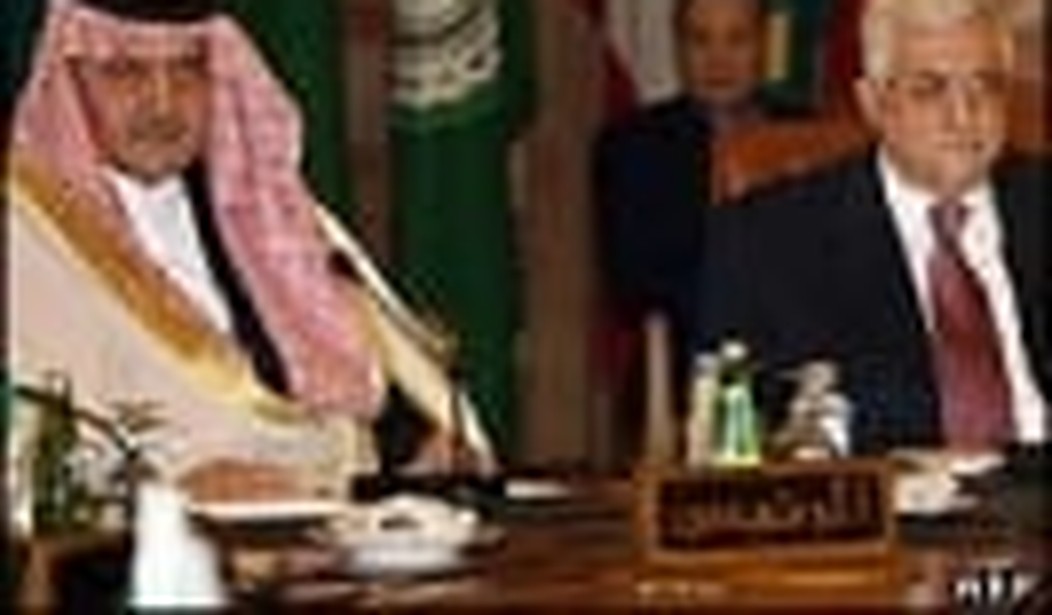After all the failed efforts at peace by parties with far greater claims to mandates, for lame-duck United States President George Bush to be climbing on the legacy bandwagon now with unpopular Israeli Prime Minister Ehud Olmert and Rump Palestinian President Mahmoud Abbas may seem like a colossal waste of everyone’s time.
In some ways it is, as demonstrated most recently by the failure of the two principal parties to agree on any kind of a joint statement ahead of Tuesday’s conference, billed as an effort to relaunch long-stagnant Mideast peace efforts and design a new way forward. That failure is not a huge matter. Peace conferences are not necessary between people who agree with each other. They take place between conflicted parties who might be interested in finding room for agreement.
But this conference, as a practical matter, may be less about agreement than division. Even if all those gathered at the table, to include a reluctant, photo-op resistant Saudi foreign minister, were to agree wholeheartedly to the status of Israeli settlements, the status of Jerusalem as a seat of political power and focus of religious devotion, to issues related to third- and fourth-generation Palestinian claims on land they abandoned or lost in battle, the conference would be as much about who is not there as it is about who is.
Hamas and Iran.
Both are outraged that this is happening, and both in the last few days have denounced it. As well they should. It poses a great danger to them, and that’s where Annapolis has the potential to move the prospects for Mideast peace forward.
With the Palestinian people in an active state of civil war, the idea of pursuing an Israeli-Palestinian peace at this time could be seen as absurd. Not a single rocket will be prevented from flying out of Gaza by words spoken or papers signed at Annapolis. The greater likelihood is that more will fly, and that Fatah members there will find themselves targeted for summary execution again. Here’s Hamas spokesman Sami Abu Zoheri, quoted this weekend in Ha’aretz.
“Resistance to the Zionist enemy will intensify through the West Bank and Gaza, because Annapolis will expose the uselessness of the process and its destructiveness.”
With Iran actively supporting Islamic terrorism in Gaza, Lebanon and Iraq, the notion that any Zionist’s handshake with a Palestinian rival will resolve anything is ridiculous. Iran is outraged to find itself further isolated. Here’s Iranian President Mahmoud Ahmadinejad at Agence France Presse, quoted by the official IRNA news agency.
“The so-called conference… is of no benefit to the Palestinian people and has the aim of supporting the occupying Zionists.”
For all the warm and encouraging words we may hear out of Annapolis, the fact is that the Palestinian people are not ready for peace, and will not be until they eject the criminals and terrorists from their midst. Iran is not ready for peace and will not be until the Iranian people eject the criminals and terrorists from their midst.
Both will continue to threaten and attack Israel and in the case of Iran, moderate Arab powers elsewhere that thwart their will.
Nor is there a great likelihood that Israel and half of the Palestinian power structure will achieve complete resolution on some of the fundamental points that divide them. But Annapolis is not going to be about ending the Israel-Palestinian dispute.
What we see shaping up at Annapolis is just another step in a long war. It is an ongoing process of dividing and conquering, by the most insidious and ultimately the only meaningful leverage for peace in a war-torn world. The recognition of self-interest. Egypt and Jordan recognized it a long time ago. Egypt isn’t thrilled about this particular conference but knows better than to sit it out. Syria has dabbled with self-interest in the past, is treacherously and violently fickle, to Syria’s own detriment. Now some of the Palestinian people are fortunate enough to be living under leadership that has recognized their self-interest.
There is the side benefit that, despite the unpopularity of America’s recent engagements in the Middle East and perceptions that the United States is weakened, the role of the United States as the ultimate power broker in the world, even with the widely despised and allegedly weakened George Bush at the helm, is underscored again.
But the best promise of Annapolis is that it could see the formalizing of the estrangement of Hamas, initiated by the summer’s revolting Palestinian-on-Palestinian violence, and the formal recognition by more Arab states that Palestinian moderates and Israel are the only legitimate players. The prospects of the return of the Golan could drive a significant wedge between terrorism-supporting Syria and Iran, whose isolation is intensified. The most intransigent parties to this conflict and their people will be provided with an opportunity to recognize their self-interest, if only incrementally.
Annapolis will not mean peace in our time. But it could be a meaningful step toward peace in someone else’s time.
Jules Crittenden blogs at Forward Movement.









Join the conversation as a VIP Member